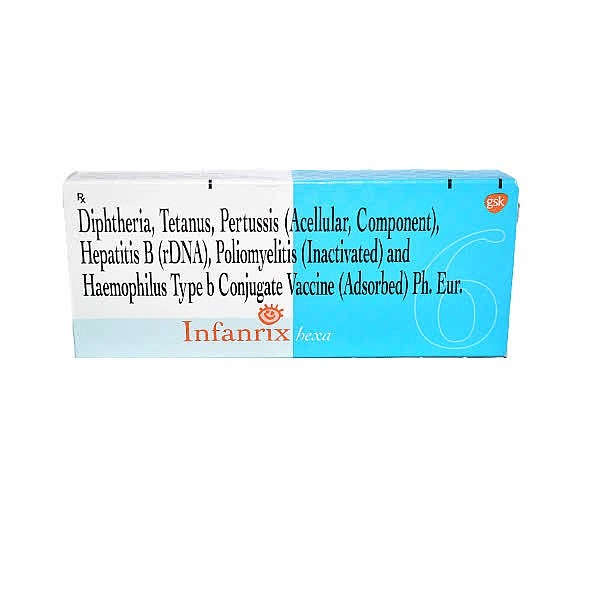No products in the cart.
Infanrix Hexa Injection is an antiretroviral medicine that belongs to the category of combination vaccines, which contains its active ingredient Diphtheria Tetanus Haemophil, Hepatitis B, Pertussis, and Poliomyelitis. It safeguards your child from Diphtheria tetanus, Haemophil, Hepatitis B, Pertussis, and Poliomyelitis. Diphtheria is a severe bacteria-related infection that primarily affects the airways and, occasionally, the skin. The airways are swollen and cause breathing issues and, in some cases, suffocation. Tetanus al., called lockjaw, is a bacterial illness caused by Clostridium Tetani. It can cause muscle stiffness as well as spasms. Haemophil (Hib) can cause muscle spasms and stiffness. An organism that can trigger severe infections, such as meningitis, pneumonia, or throat-related infections, particularly for children. Hepatitis B is an infection caused by viruses that can affect the liver. It is a risk factor for chronic liver disease and raises the chance of developing liver cancer. Pertussis, sometimes called whooping cough, is a contagious respiratory illness due to Bordetella Pertussis. Poliomyelitis, also called polio, is a virus that can lead to paralysis and muscle weakness.
It is not recommended to give it if you have a child who is sensitive to the vaccine or any of its components. The allergic reaction may be manifested as itchy skin, inflammation, breathlessness, and swelling on the tongue or face. If your child’s experience has been characterized by nerve system issues within the last seven days after receiving a vaccination for whooping cold, Infanrix Hexa Injection shouldn’t be given. The most important thing to remember is that this vaccine is not recommended if your child suffers from an acute infection with temperatures exceeding 38 degrees. Conditions that are minor, such as colds, do not cause concern; however, it is advised to speak with a physician before administering the vaccine. If your child has a fever, consult a medical expert before vaccinating. They will determine if the vaccine is best delayed until the fever subsides or if it is appropriate to continue.
This vaccine is not advised if your child suffers from an underlying bleeding disorder or is taking anticoagulant treatment. Certain precautions are required to limit the risk of bleeding from the site of injection. It is crucial to inform your medical professional of any bleeding-related disorders or medications your child is taking. The immune reaction to the vaccine could be diminished if your child has a weak immune system due to an illness or medication. The vaccine’s effectiveness may also be reduced in these situations, and your healthcare provider will need to weigh the potential risks and advantages of administering the vaccine. If your child is prone to seizures or has an extended previous history in the family of febrile seizures, it is essential to discuss the issue with a medical expert.








